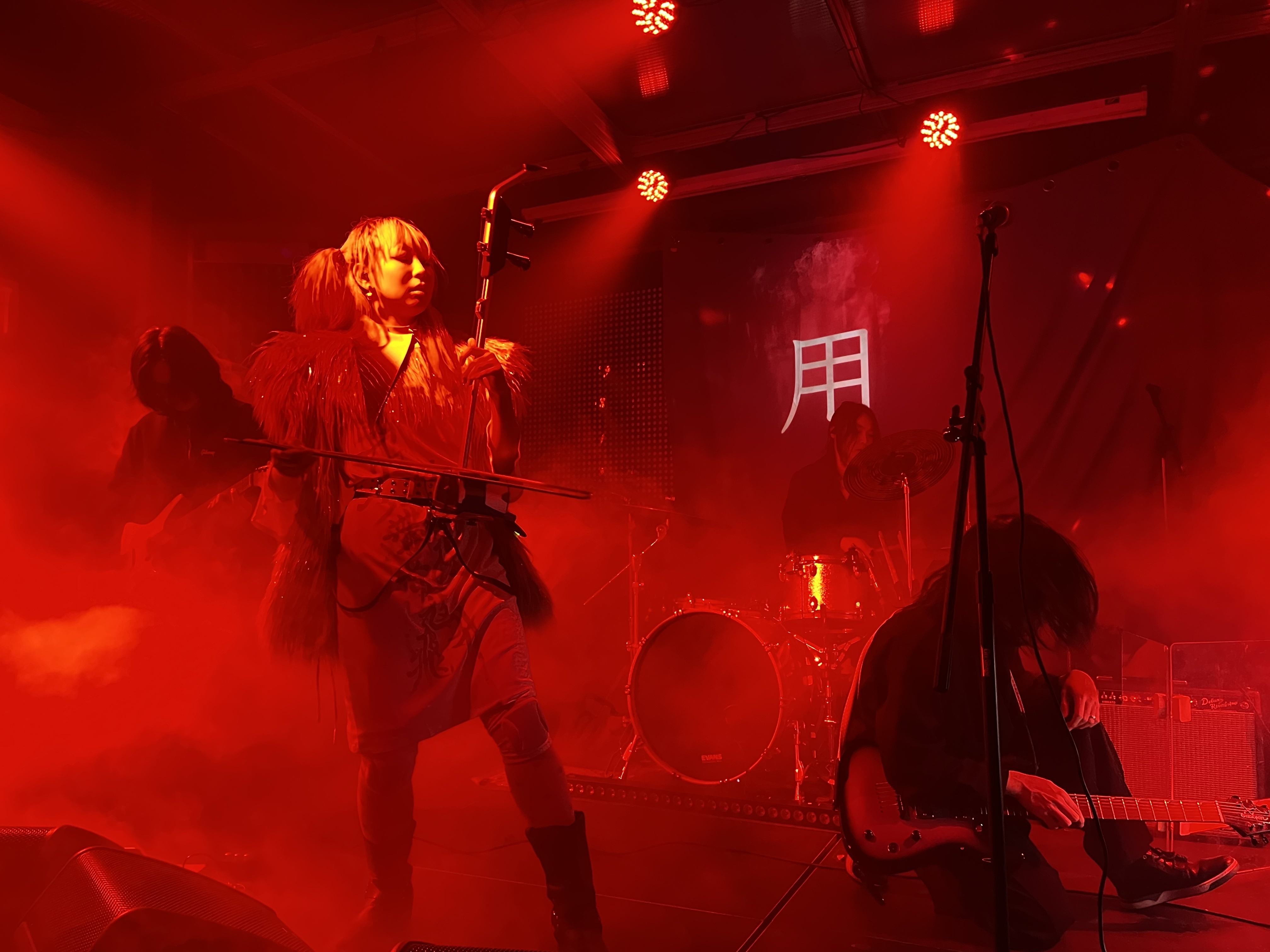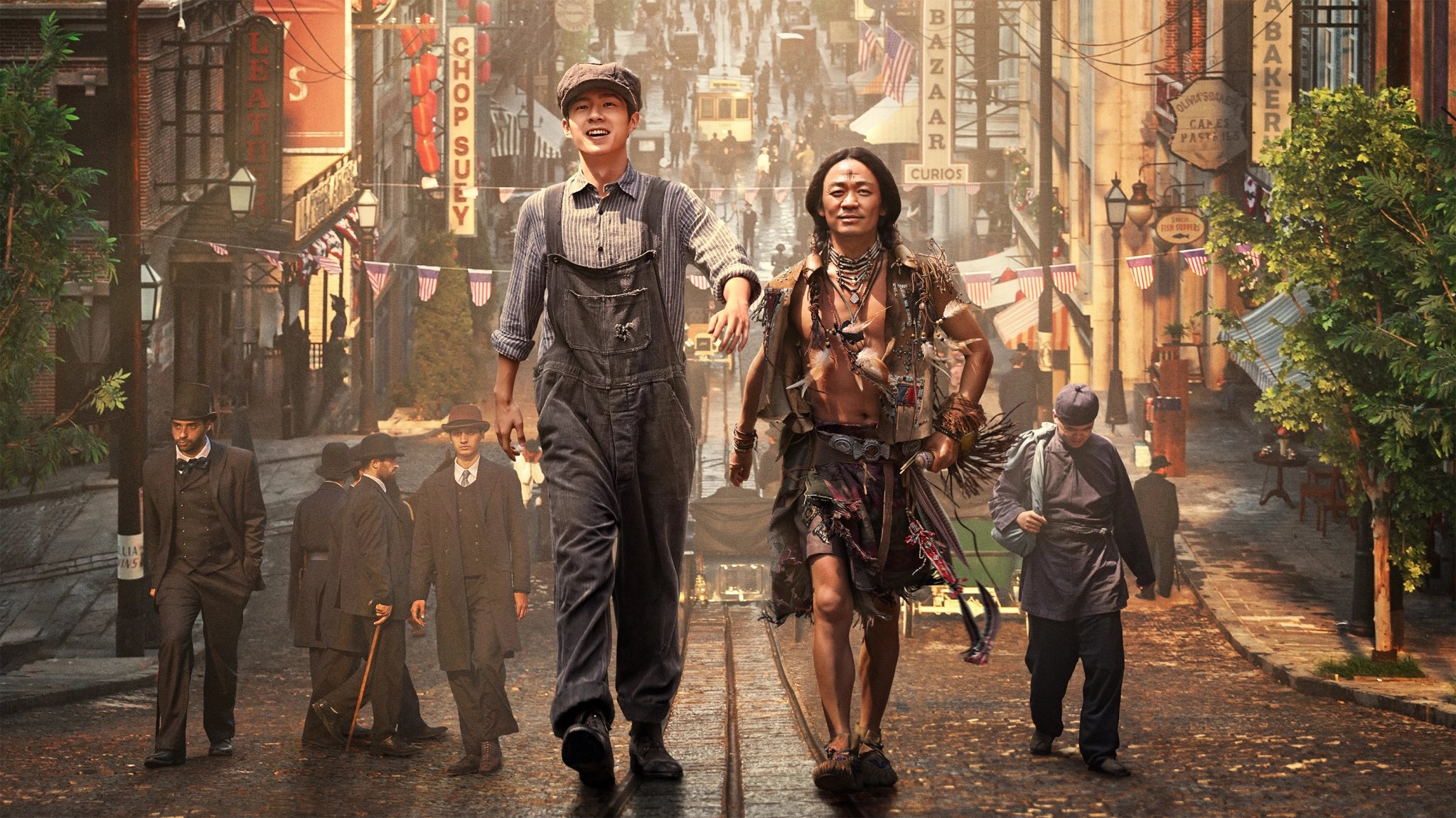Ale Amazonia or ‘Amazon, the Savage’ is the nom de guerre of Alexandre Leal de Almeida, an artist, musician, and culture producer from Curitiba, Brazil. In 2012, he left his tropical settings to try life in Shanghai — a rebel act, in essence.
“I wanted to experience a country where Anglo-Saxon or European influences were not the mainstream ethos,” he says.

Ale Amazonia (far left) and the other band members of Oh! Dirty Fingers
In China, Ale (pronounced as the French ‘allez’ and like the type of beer) found his crowd of fellow rebels. For years, he roamed the smoke-filled clubs of the Chinese underground music scene, joining the masses in their nihilistic yelling and nonconformist energy. He was part of the act, or so to speak.
From 2014 to 2020, Ale played the drums for the Shanghai punk band Oh! Dirty Fingers, and toured the country with the band’s three other members, all trying to make their way to stardom — or at least to the afterparty.
Ale has been back in Brazil since 2020 and recently published a memoir, Mil Olhos, Mil Braços: Relatos de um Punk Antropofágico na China Vermelha, which translates to A Thousand Eyes, a Thousand Arms: Stories of an Anthropophagic Punk in Red China.

Cover of Mil Olhos, Mil Braços: Relatos de um Punk Antropofágico na China Vermelha
In a little over 200 pages, he recounts the adventures of his 10 years in the country, most of them in the company of the boys of Oh! Dirty Fingers.
Here’s what he told us about the book:
RADII: What was your motivation behind writing this book?
Ale Amazonia: The book is an autobiographical narrative that pays tribute to this major experience that was my life in China and tells the story of what we’ve been through as a band. I wrote it to not be forgotten, as well as to put an end to this chapter of my life.
RADII: Can you tell us about your relationship with Dirty Fingers?
AA: [Laughs] I just wrote 200 pages about it! I can’t really make it short, but to give you some sort of answer, I will say that Dirty Fingers is like my family in China. We worked together from the band’s very beginning in 2014 to 2020. I was their drummer slash composer slash producer.
Even if we’re not working together now, we still message each other and support each other’s work however we can.

Shanghai-based punk band Oh! Dirty Fingers before Ale Amazonia’s departure
RADII: What were the songs about? Was there anything specific the band wanted to express through music? Was there a political stance?
AA: I think everything is political. From the very fact that we distanced ourselves from entertainment music — by not having a set list or a polished sound — to our self-destructive relationship with drugs and even the sexual obscenity in the band’s name. All these are explicit political aspects.
At least, that’s what I think. The other members of the band might see things differently. The best person to answer about the lyrics and what they mean is Guang Xiaotian, the main vocalist. He wrote most of them.
RADII: How do you see the underground music scene in China in terms of influences? Does it look up to, say, its British or German counterparts?
AA: In terms of influence, yes. Both scenes you mentioned played a significant role in the early stages of the Chinese underground scene in the 2000s. But none of the Western scenes have the same dose of heroism and nihilism that China and other Eastern countries have, especially considering the personal life of the artists.
In the East, freedom of expression comes with great responsibility. This makes a huge difference. It’s also what makes it unique.
RADII: And how do you think the Chinese scene compares with other countries, like the U.S. or even Brazil?
AA: There are two sides to it. It’s easier to play, tour, and produce in China because of what the CCP provides in infrastructure and transportation. Still, on the other side, you’re under their vigilant, all-seeing eyes, which creates a weird atmosphere.
The relationship between artists, audiences, promoters, producers, and journalists can be like walking in a minefield. You can risk your career and even your freedom.

Punk band Oh! Dirty Fingers at an event
RADII: Since you mentioned the audience, what’s the interaction usually like with them? Is there a place where this interaction is more intense?
AA: Beijing is the most intense city I have ever performed in China. By far. That said, I have never played in Northeast China, where I believe it could also be quite intense.
I say this because the North and Northeast regions are more polluted, economically unequal, and have a more soul-crushing atmosphere than the rest of the country. All these factors combined create a cathartic interaction between artists and audiences. I felt that in Beijing.
In Beijing’s punk scene, people throw things at you on stage. They raid the stage and take the microphone from your hand; they fall on the floor drunk as skunks. The girls grab you by the neck, get the crew members drunk, and take them home. The men fight, and then they kiss each other.
— Excerpt from ‘Mil Olhos, Mil Braços: Relatos de um Punk Antropofágico na China Vermelha’
RADII: Would you say alternative artists and groups in the Chinese underground scene are more of a target than pop bands or anything mainstream?
AA: I wouldn’t say a fixed target, but definitely a moving target. But that’s with every artist in the country. It can be even harder for pop bands than bands in the alternative scene. The underground is a fairly safe environment if you don’t have major career ambitions. In other words, if you don’t want to grow out of your small bubble, you’re safe, like with everything in life.
RADII: How do you think people in the underground scene deal with the pressure and restrictions coming from the top? Does it stop them in any way? Does it frighten or threaten them?
AA: It’s an inescapable relationship, similar to dealing with an abusive or arbitrary parent who often changes the rules without warning. For sure, it frightens and threatens every artist in the country to some extent.

Punk band Oh! Dirty Fingers
RADII: Did it frighten you? How did you deal with it?
AA: I’ve been arrested and had my visa canceled once. So every time I step on a stage in China or give an interview like this one, I’m very aware of the potential consequences. But that never stopped me from doing the art I believe in. It’s the same with my ex-bandmates and most artists operating in the country.
RADII: Based on what you experienced, do you think the higher-ups understand the connotations and hidden meanings of punk rock songs or do they get attached to more blatant elements like, for instance, swear words?
AA: In terms of music, it comes down to an agency responsible for approving lyrics and issuing tax codes for the commercialization of each track. Without this code, your music cannot go up on any platform or be released by any labels in China. So yes, they’re very much aware of what we say.
Still, interestingly, most of the control doesn’t come from there. When we talk about this level of control, it’s essential to remember that it’s not about a single entity but something present in every aspect of life in the country.
It does not come from any official entity or person but from the owners of venues, promoters, producers, the public, and even artists’ family members that won’t tolerate any form of subversive content. There isn’t a guidebook on how it operates. Ultimately, it’s a collective act.
RADII: And how did this affect you and the band?
AA: That’s in the book. [Smirks]
RADII: Assuming you were targeted. How would you feel?
AA: As if a seal of success had been given to us. That’s what I would feel.
I can’t sleep. I keep mulling over the strange coincidence of being arrested on the same day I boarded the plane to live in China five years earlier. I cry silently, staring at my cell’s bright lights and the bars.
— Excerpt from ‘Mil Olhos, Mil Braços: Relatos de um Punk Antropofágico na China Vermelha’
RADII: How did the band end?
AA: Oh, the band is not over. They’re still together. I’m the only one who left. And I believe this was the best thing that ever happened to them, both financially and commercially. There’s way less bureaucracy [when there’s no foreigner involved], and they reach a larger audience as a result.
RADII: Your book is only available in Portuguese now. Do Chinese audiences even know about it?
AA: Only my close friends and people that follow me on Western social media platforms know about the book.
RADII: What about in Brazil? How has your book been received?
AA: As an edgy, niche piece, mainly for people studying or researching China, especially in academic circles. The book is a pioneering anthropological essay. For the general public, this story sounds way too crazy to be appreciated.
RADII: How do you think the broader public in Brazil perceives China? Do you think they even realize there’s such a thing as an alternative scene in China?
AA: To put it bluntly: they know nothing. But then again, most Chinese people don’t know anything about Brazil. In Brazil, all they know about China is based on old-fashioned stereotypes. You know, kung-fu, pandas, tea, silk, porcelain, and of course, cheap manufactured products.
That’s why my story sounds way too crazy to be appreciated by the wider public. It’s so far out of what they know.

Punk band Oh! Dirty Fingers
RADII: Does your book have the potential to change this narrow view of China?
AA: I did my best to portray a contemporary and pleasant view of Chinese culture. Although I express all the complexity of my emotions for it, ultimately, the book is a romantic memoir.
RADII: In retrospect, how do you feel about your 10 years in China?
AA: Very grateful. No regrets. If I had regrets, it would probably relate to my lack of maturity in private matters, but this has nothing to do with the band.
RADII: When can we expect the book to be available in English?
AA: I’m currently searching for an English publisher. So, hopefully, within the following year.
RADII: In Chinese?
AA: In Chinese, we need to let the dust settle. I think I must follow the unwritten rule of waiting at least 10 years after the fact before even thinking about publishing it.
RADII: Do you have any plans to go back to China?
AA: To work, for sure; to live, not so sure.
Ale Amazonia’s book ‘Mil Olhos, mil Braços: Relatos de um Punk Antropofágico na China Vermelha’ is available on Amazon Brazil.
Interview lightly edited for clarity and brevity. All images courtesy of the artist







































